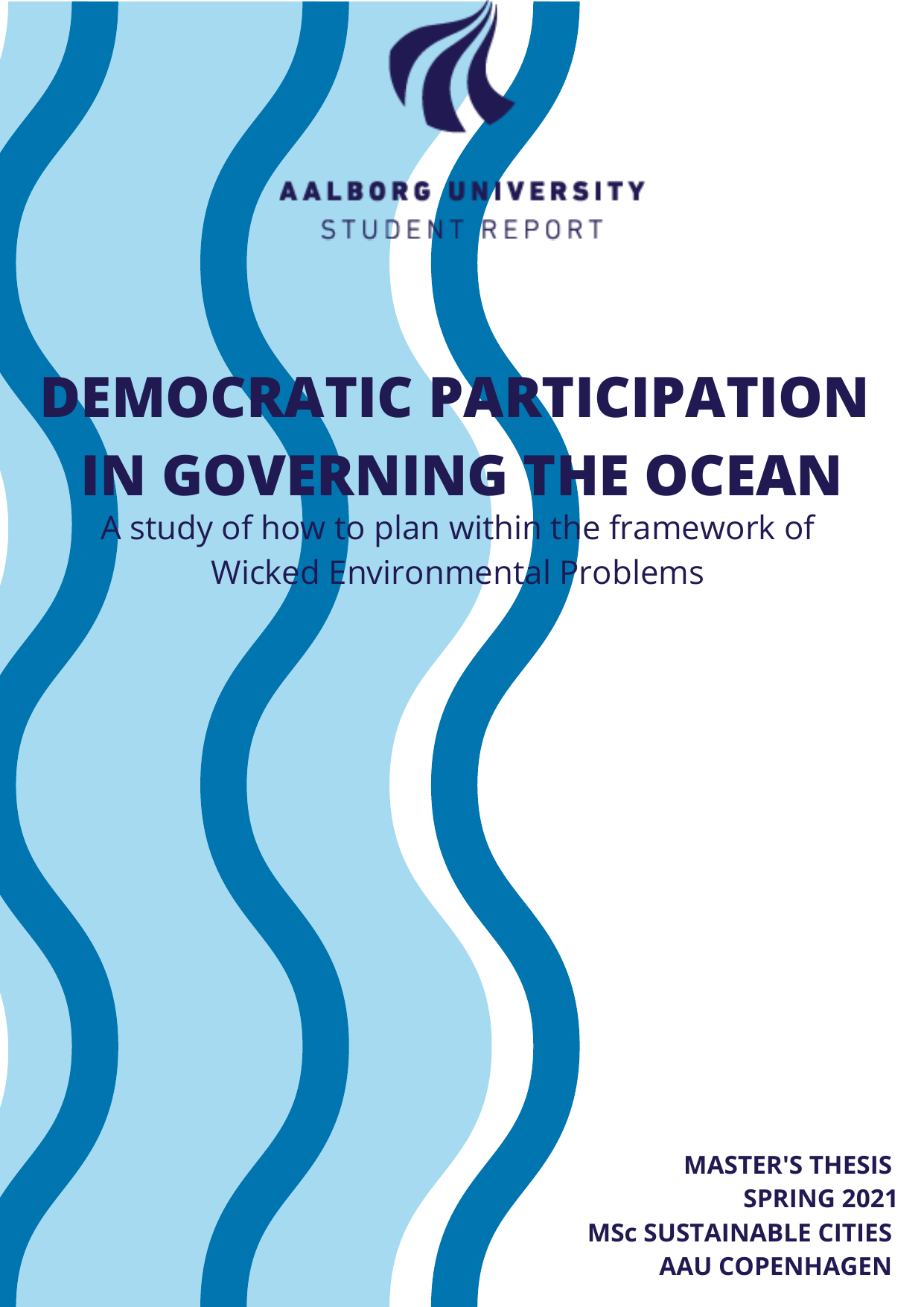
Democratic Participation in Governing the Ocean: A study of how to plan within the framework of Wicked Environmental Problems
Author
Term
4. term
Education
Publication year
2021
Submitted on
2021-06-03
Pages
63
Abstract
Nærværende speciale behandler, hvordan demokratisk deltagelse i planlægning af havet kan øge den miljømæssige bæredygtighed. Specialet er således baseret på EU’s direktiv om Maritim Fysisk Planlægning og Danmarks første Havplan. Kritisk teori anvendes som det overordnede teoretiske perspektiv. Derudover bruges Governing the Commons til at forklare samarbejdet mellem aktører ved planlægning af fælles naturressourcer. Desuden anvendes deliberativt demokrati og Marine Citizenship til at forklare, hvordan øget demokratisk deltagelse i planlægning af havet kan øge den miljømæssige bæredygtighed Analysen er baseret på semistrukturerede interviews med aktører fra henholdsvis UNESCO IOC, Søfartsstyrelsen og WWF. Derudover anvendes sekundære empirisk data, herunder Konsensuskonferencen Vores hav, en borgerinddragelsesproces, der blev afholdt i oktober 2020. Analysen indikerer, at styringsmedierne: penge, hierarki og magt, herunder undvigelse, er til stede i processen med at udvikle Danmarks Havplan. Derudover indikerer analysen at grundet utilstrækkelig demokratisk deltagelse blandt relevante aktører, har det muligvis medført en lavere opbakning blandt politikere, erhvervs- og interesseorganisationer, ngo'er og forskere. Desuden indikerer analysen, at fordi konsekvenserne er så enorme, er det nødvendigt at den generelle befolkning forstår, hvorfor det er vigtigt at sikre et sundt hav. Konsensuskonferencen viste, at når borgere bliver involveret i komplekse problemer, kan de gennem øget indsigt og viden (literacy) danne og udvikle deres meninger samt, at øget literacy kan fremme en ændring i værdier og adfærd. Desuden indikerer analysen manglende forståelse for, hvordan planlægning og gennemførelse af borgerinddragelsesprocesser påvirker udfaldet af resultaterne. Analysen viser, at der er behov for, at planlægning i højere grad forstår at arbejde inden for rammerne af de stigende kompleksiteter.
The Master’s Thesis examines how democratic participation in governing the ocean can increase sustainability. Thus, the Thesis is based on the EU´s Directive of Maritime Spatial Planning and Denmark's first Maritime Spatial Plan. Critical Theory is applied as the overall theoretical perspective. In addition, Governing the Commons is used to explain cooperation among stakeholders when governing common natural resources. Furthermore, Deliberative Democracy and Marine Citizenship are applied to explain how increased democratic participation in governing the ocean can increase ocean sustainability. The analysis is based on semi-structured interviews with actors from the UNESCO IOC, the Danish Maritime Authority, and WWF, respectively. In addition, secondary empirical data is used, including the Consensus Conference Our Ocean, a citizen participation process, which was held in Oct. 2020. The analysis indicates that the mediums of money, hierarchy, and power, including avoidance, are present in the process of developing Denmark’s Maritime Spatial Plan and because indication shows insufficient democratic participation among relevant actors, which might have led to a lower support among politicians, business and interest organizations, NGOs, and researchers. Furthermore, the analysis indicates that because the consequences are so enormous, the general population must understand why it is essential to ensure a healthy ocean. The Consensus Conference demonstrated that when citizens become involved in complex problems, they can, through increased literacy, form and develop their opinions and that increased literacy can foster a change in values and behavior. Moreover, the analysis indicates a lack of understanding of how the planning and execution of citizen participation processes affect the results. Thus, the analysis shows that planning needs to work within a wicked planning framework.
Keywords
Documents
